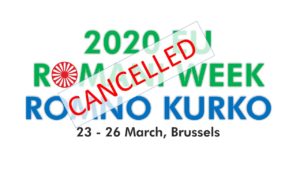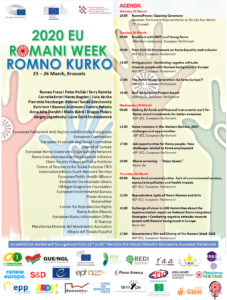Due to coronavirus precautions taken by the European Parliament for the next three weeks, Romani Week will be postponed for later this year.
 Policymakers, experts, activists and organisations concerned with persistent antigypsyism in Europe will collaborate for a fifth consecutive year to organise the Romani Week in the European Parliament ahead of the International Romani Day.
Policymakers, experts, activists and organisations concerned with persistent antigypsyism in Europe will collaborate for a fifth consecutive year to organise the Romani Week in the European Parliament ahead of the International Romani Day.
Romani Week 2020 aims to build on the work done during previous Romani Weeks and debate the post 2020 EU policies for Romani Inclusion. It will call upon the European Commission and EU Member States to put the fight against antigypsyism at the forefront of efforts for the social and economic inclusion of people with Romani background.
The week will consist of a series of events which will provide recommendations on combating antigypsyism and continued structural discrimination and on the effectiveness of the post 2020 EU policies for people with Romani background.
PROGRAM
Monday 23 March
18:30 RomnoPower: Opening Ceremony of the Romani Week 2020
Bavarian Permanent Representation to the European Union, Rue Wiertz 77, Brussels
Tuesday 24 March
08:00 Breakfast with MEPs and Young Roma
Members restaurant, European Parliament
MEPs and Commission officials are sitting with a small group of young Roma advocates to discuss the challenges for Europe’s young Roma in an informal but stimulating setting. Topics to be discussed are strategic investments into the empowerment and participation of Romani youth in the post-2020 European Framework for National Inclusion Strategies period, strengthening of Romani youth political participation, and fight against antigypsyism.
No open registration
09:00 Post-2020 EU Framework on Roma Equality and Inclusion
ASP 3E2, European Parliament
The objective of the event is to further consult the wider range of stakeholders on the new post 2020 Roma equality initiative priorities. It precedes the 2017 public consultation on the EU Framework for NRIS up to 2020, the 2018 workshop validating the preliminary results of the evaluation, the 2019 Roma week event on evaluating the EU Framework for National Roma Integration Strategies, multiple rounds of individual consultations with Civil Society Organisations, which provided contributions on the forward looking results of the evaluation or feedback on the background papers for the October workshop. Specifically, it aims to shaping the future Roma policy by gathering views on clear targets, indicators of key areas of focus, including education, employment, health and housing, concrete political support, transnational cooperation, EU mobility, etc.
13:00 Antigypsyism – Combating negative attitudes towards people with Romani background in Europe
ASP 3E2, European Parliament
Antigypsyism is a form of racism experienced by people with Romani background all over Europe and beyond. Many of them face severe exclusion from all domains of public life, including from education, employment, housing and health. Romani people are usually judged based on stereotypes and they are often victims of discrimination and violent acts such as hate-crime and hate-speech, including hate-speech of mainstream politicians.
Therefore, it is a high time to discuss what does ‘an initiative to combat antigypsyism’ should be about. The main aims of the event are to raise awareness about misconceptions of the phenomenon ‘antigypsyism’ and better understand how to address it on the ground.
17:00 The Roma Young Generation: So Keres Europa!?
ASP 5G1, European Parliament
The round table titled “So Keres Europa!?” (in Romanes “What’s up, Europe!?”) aims to present the challenges that European Young Roma face in their everyday lives, based on a Europe-wide ongoing research among Roma youth organisations, but also to seek for new opportunities for young Roma people.
The event aims to discuss the role of Roma Youth in the post-2020 implementation of the European Framework for National Inclusion Strategies of the European Commission as well as to present what’s next after the end of the Roma Youth Action Plan of the Council of Europe.
No open registration
19:00 Best Roma Youth Project Award
MEP Salon, European Parliament
ternYpe International Roma Youth Network and Phiren Amenca International Network will award for the very first time the “Best Roma Youth Project Award 2020” as part of the EU Romani Week in order to promote Roma Youth Participation in Europe.
Representatives of the best five project ideas will be invited to take part in the EU Romani Week and the seminar organized by the Roma Youth Networks in Brussels between 22-27 March 2020. The best Roma Youth Projects will be awarded by the ternYpe and Phiren Amenca Team and Romani MEPs.
No open registration
Wednesday 25 March
09:00 Making EU funds and financial instruments work for Roma: smart investments for better outcomes
ASP 5E2, European Parliament
The event aims to:
• Raise awareness on the different funding instruments available for Romani inclusion, positioning Romani inclusion & empowerment at the centre of sustainability agenda;
• Identify barriers and success factors in adequately channelling EU funding for addressing challenges faced by Romani people;
• Provide recommendations on how to overcome such challenges and identify new models and opportunities in order to make the best use of EU funding for inclusive growth;
The event will also stress the importance of applying the partnership principle and code of conduct in engaging the voice of different stakeholders, especially Romani people.
13:30 Roma inclusion in the Western Balkans, 2020 challenges and opportunities
ASP 5E2, European Parliament
The event aims to:
• Present the Poznan Declaration, steps taken for its implementation and the precedent set by this initiative in the context of the formulation of the post-2020 Roma integration policy;
• Listen to the voices of the most vulnerable returnees;
• Listen to and discuss the challenges and successes of EU Member States responsible for returns and arrival Western Balkans partners to identify areas for closer cooperation and synergies;
• Present how the EC envisages improving the reintegration of returnees in Western Balkans and enhancing the collaboration between countries of origin and countries of departure.
17:00 Job opportunities for Roma people – New challenges related to Roma employment
ASP 5E2, European Parliament
The event aims to:
• Understand from industry leaders how they imagine the society will look like in 2030 and what they think the jobs of the future look like;
• Raise awareness on the danger advanced technology will pose on number and type of jobs in the Roma communities;
• Identify ways to start investing in building the right skills for people aged 10, 20 and 30 years old to enable them to be better positions for the 2025 – 2035 job market;
The event will also stress the importance of applying the partnership principle and code of conduct in engaging the voice of different stakeholders, especially Roma.
19:00 Movie screening – “Gipsy Queen”
Room tbc, European Parliament
Roma Actress Alina Serban – Best Actress @ PÖFF Black Nights Film Festival 2019 for “Gipsy Queen”
“For her strong performance in committing herself flawlessly to the character and its challenging physical demands.”
“30 year old Ali has the heart of a lioness, is proud, doesn’t complain and works herself to the bone for her two children, as a cleaner in Hamburg’s famous nightclub “Ritze”. But deep in her heart Ali carries a wound: after she became an unmarried mother in Romania she was disowned by her father – for whom, until then, she was the Gypsy Queen, the queen of all Roma. When Ali discovers the boxing ring in the Ritze’s basement one day and gets to watch a fight, it brings back memories of boxing training with her father. Fully equipped and disappointed by life, Ali vents all her fury on the punching bag one evening. Tanne, ex-boxer and owner of the Ritze sees her and recognizes her talent. She starts to box again and sees the chance for a better life.”
Thursday 26 March
09:00 Roma Environmental justice – Lack of environmental services, exposure to pollution and health impacts
ASP 5E2, European Parliament
The objective of the conference is to create a higher awareness of environmental determinants of health, such as environmental discrimination against Roma communities and its impact on health to set the issue on the European and national political agenda. The conference further allows for the first exchange between European and national policymakers, researchers, civil society and Roma people to create a systematic understanding of health inequalities and environmental discrimination, two closely related issues, and to discuss solutions and policy options to address these public health and environmental issues.
12:30 Reproductive rights of Roma Women and Girls
ASP 5E2, European Parliament
The side event will emphasize the importance of ensuring an intersectionality perspective when addressing structural discrimination and inequalities with regard to Roma health. To ensure equality in health care, it is imperative that both EU and national policies related to Roma health and gender equality adequately address the multiple and intersectional forms of discrimination that Roma women and girls face in reproductive health care settings and outline strong actions to eliminate these inequalities.
15:00 Exchange of views in LIBE Committee about the implementation report on National Roma Integration Strategies – Combating negative attitudes towards people with Romani background in Europe.
Room tbc
No open registration
17:00 Documentary film and Closing of the Romani Week 2020
Roma is the biggest minority in Europe. We live together with them, in the same cities, in the same countries. However, they are the strangers next to us and too often, we appeal to the well-known “Roma integration issues” expression in order to justify the fact that we do not know them.What does it mean to be a Roma in Europe? Why do Roma people have an integration issue and what is it exactly? How did we come up to this situation? What happened with Roma people in the past? What is the relationship between Roma people and the authorities? What do Europeans know about Roma people? What are Roma struggling with in their daily lives? Can we describe Roma people in a certain way?
These are questions that maybe some of us thought about, but didn’t get an answer. And for others, those can be questions that they never asked themselves.
Throughout this documentary, we hope to bring some light to the audience about the meaning of being a Roma in Europe. The documentary brings answers to some questions already raised, trying to describe the situation that Roma people lived in the past, their current status and the steps envisaged for the future.
This is a story produced and directed by a Roma journalist, seen through the eyes of a lifetime observer of this situation who often asked herself these questions.
A cocktail reception will be organized by the host MEPs to close the Romani Week 2020.


